This series really is the agony and the ecstasy of sports anime on display.
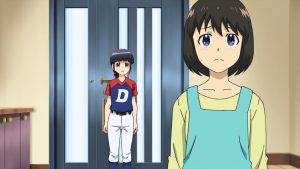 In looking back over the long history of baseball anime (and possibly manga), I don’t think there’s ever been a writer as good at depicting little league baseball as Mitsuda Takuya with Major. There are certainly other examples (recently, the never-adapted Saigo wa Straight was quite winning), but none which capture the emotional breadth and comedy of the premise like Major does. The focus is always more on older kids, especially high schoolers (Koushien is the biggest sporting event in Japan after all), but there’s something special about seeing sports through the eyes of those for whom it truly is still more a game than a sport.
In looking back over the long history of baseball anime (and possibly manga), I don’t think there’s ever been a writer as good at depicting little league baseball as Mitsuda Takuya with Major. There are certainly other examples (recently, the never-adapted Saigo wa Straight was quite winning), but none which capture the emotional breadth and comedy of the premise like Major does. The focus is always more on older kids, especially high schoolers (Koushien is the biggest sporting event in Japan after all), but there’s something special about seeing sports through the eyes of those for whom it truly is still more a game than a sport.
 Here’s the thing about shows like this, at least for me – they put you through the wringer. The classic sports cliffhangers are brutal. And when adversity happens, you feel it differently than you do in, say, Cross Game or Yowapeda. A really great sports series about kids – and Major and Ginga e Kickoff are probably the best ever at it – makes you want so badly for the characters to succeed that it almost feels like they’re your own children (or younger siblings, depending on how old you are). When they suffer, you suffer. In a sense, that’s about as strong of an endorsement for a series as you can get.
Here’s the thing about shows like this, at least for me – they put you through the wringer. The classic sports cliffhangers are brutal. And when adversity happens, you feel it differently than you do in, say, Cross Game or Yowapeda. A really great sports series about kids – and Major and Ginga e Kickoff are probably the best ever at it – makes you want so badly for the characters to succeed that it almost feels like they’re your own children (or younger siblings, depending on how old you are). When they suffer, you suffer. In a sense, that’s about as strong of an endorsement for a series as you can get.
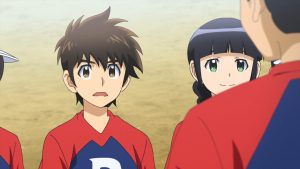 That Mitsuda-sensei is able to accomplish this with equal success through two completely different characters is a testament to his talent. Daigo is so unlike his father – a little neurotic who spends his pregame in the bathroom wrestling with his reluctant stomach. He greets the news that he’s been moved up to second in the order not with glee, but disbelief and then a sense of dread – fear that he’s not good enough to justify it. Everything Toshiya-san says about kids baseball is true – the game is full of mistakes – but for those immersed in it, it still feels like the center of the universe (all of which is watching you).
That Mitsuda-sensei is able to accomplish this with equal success through two completely different characters is a testament to his talent. Daigo is so unlike his father – a little neurotic who spends his pregame in the bathroom wrestling with his reluctant stomach. He greets the news that he’s been moved up to second in the order not with glee, but disbelief and then a sense of dread – fear that he’s not good enough to justify it. Everything Toshiya-san says about kids baseball is true – the game is full of mistakes – but for those immersed in it, it still feels like the center of the universe (all of which is watching you).
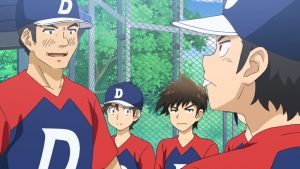 One of the things that’s genuinely emotional about this episode for me are the moments when Daigo realizes that other people believe in him, and it shows through on his face. That’s especially true of Satou of course, and it’s impossible to overstate how much the support and belief of this kind soul has meant to Daigo. But there’s also the likes of Urabe, who takes every opportunity to beat Daigo down and destroy the confidence that already comes so reluctantly for him. Kids will be kids, I suppose.
One of the things that’s genuinely emotional about this episode for me are the moments when Daigo realizes that other people believe in him, and it shows through on his face. That’s especially true of Satou of course, and it’s impossible to overstate how much the support and belief of this kind soul has meant to Daigo. But there’s also the likes of Urabe, who takes every opportunity to beat Daigo down and destroy the confidence that already comes so reluctantly for him. Kids will be kids, I suppose.
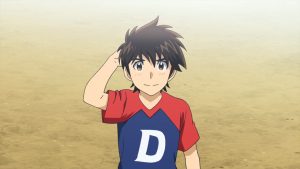 Urabe is, indisputably, a terrible teammate – why in the world would you intentionally undermine your colleague when he’s about to take the field? There’s a fundamental difference between Urabe and the 12 year-old Honda Goro, above and beyond the fact that Goro was a legit phenom and Urabe is just a pretty good pitcher with delusions of grandeur. While Goro had moments when he slipped on this front, he was still all about the team winning – how many hours did he dedicate to training those less skilled than he? Urabe, by contrast, is all about Urabe – winning or losing only matters to the extent that it reflects on him personally. Even his only friend on the team, Andy, seems to realize this about him.
Urabe is, indisputably, a terrible teammate – why in the world would you intentionally undermine your colleague when he’s about to take the field? There’s a fundamental difference between Urabe and the 12 year-old Honda Goro, above and beyond the fact that Goro was a legit phenom and Urabe is just a pretty good pitcher with delusions of grandeur. While Goro had moments when he slipped on this front, he was still all about the team winning – how many hours did he dedicate to training those less skilled than he? Urabe, by contrast, is all about Urabe – winning or losing only matters to the extent that it reflects on him personally. Even his only friend on the team, Andy, seems to realize this about him.
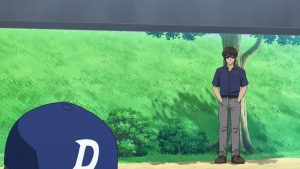 The problem, of course, is that for now Urabe and Andy are the only hope the Dolphins have of being successful. Hikaru-kun is shyly staying in Gunma, unwilling to take up his dad’s offer of a Shinkansen ticket on the grounds that he’d be seen as a carpetbagger if he swept in and took someone else’s position. As for Daigo, he has opportunities to influence the game – first with a successful bunt (which ends up a hit – though he did miss the sign on the first pitch), then with a great diving catch. But he also almost gets picked off first and then is thrown out at second on a hit to center because he was too conservative in leading off and breaking from first.
The problem, of course, is that for now Urabe and Andy are the only hope the Dolphins have of being successful. Hikaru-kun is shyly staying in Gunma, unwilling to take up his dad’s offer of a Shinkansen ticket on the grounds that he’d be seen as a carpetbagger if he swept in and took someone else’s position. As for Daigo, he has opportunities to influence the game – first with a successful bunt (which ends up a hit – though he did miss the sign on the first pitch), then with a great diving catch. But he also almost gets picked off first and then is thrown out at second on a hit to center because he was too conservative in leading off and breaking from first.
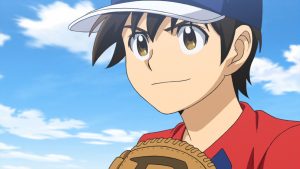 This is Daigo – a nervous little kid who understands the game but has trouble controlling his emotions in moments of pressure. In other words, a human being – and not a one-off wunderkind like his dad. He makes mistakes from too much eagerness or too much trepidation, and beats himself up over every one. Every step of Daigo’s journey feels like progress because he has to earn every one of them, and Mitsuda (and Watanabe-sensei) make sure we feel that right along with him. That’s why Daigo is a great protagonist, and why Major 2nd is a great baseball anime.
This is Daigo – a nervous little kid who understands the game but has trouble controlling his emotions in moments of pressure. In other words, a human being – and not a one-off wunderkind like his dad. He makes mistakes from too much eagerness or too much trepidation, and beats himself up over every one. Every step of Daigo’s journey feels like progress because he has to earn every one of them, and Mitsuda (and Watanabe-sensei) make sure we feel that right along with him. That’s why Daigo is a great protagonist, and why Major 2nd is a great baseball anime.
(Note: Happily the concern I expressed in last week’s post about this being a one-cour was for naught – a second OP single was announced this week, so we’re getting at least two cours for sure)


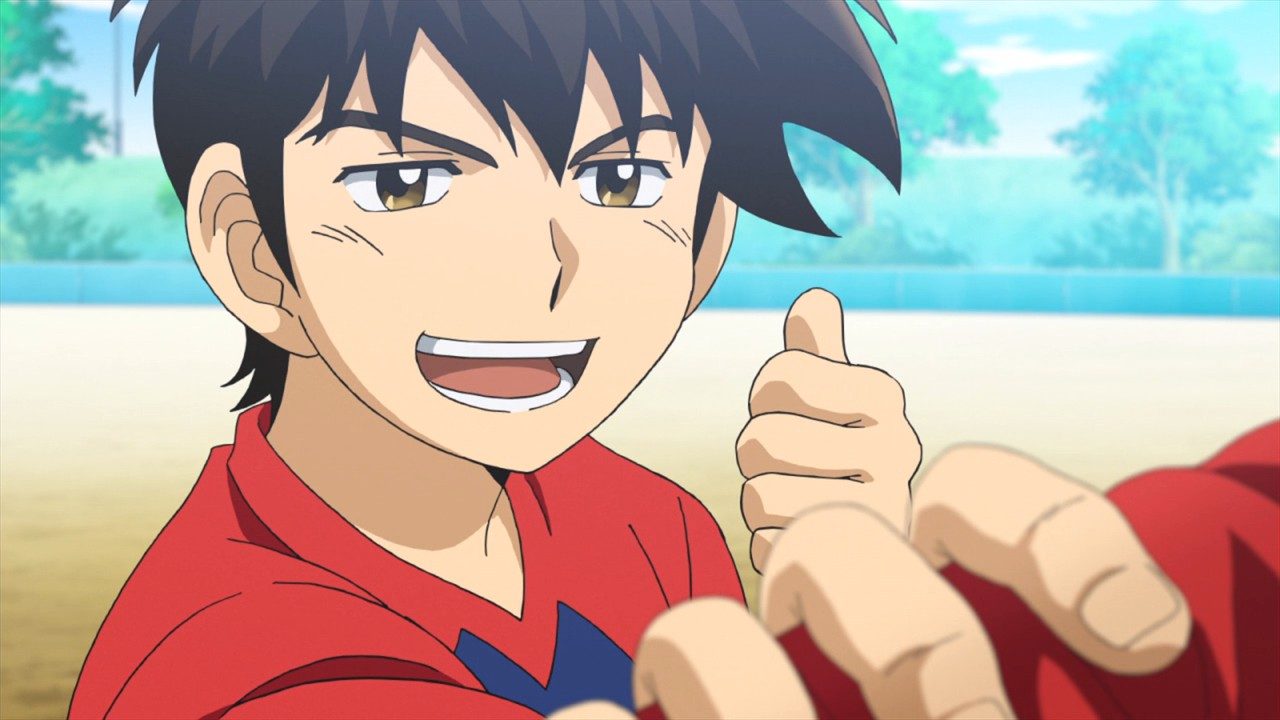
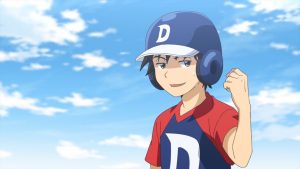
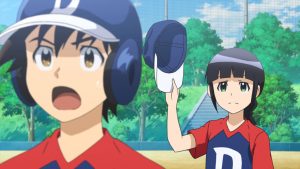

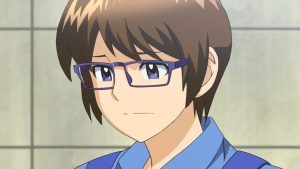
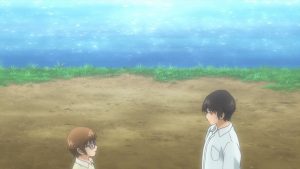

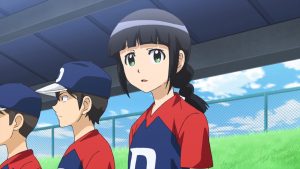
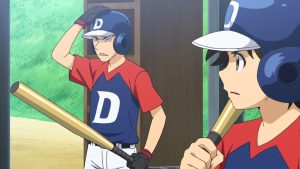
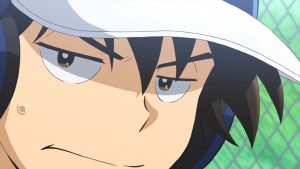
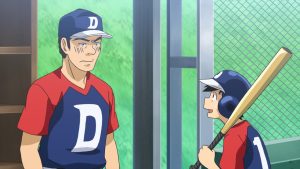

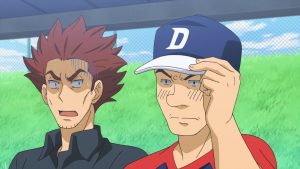

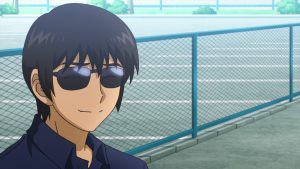

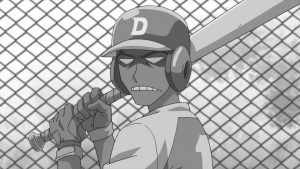
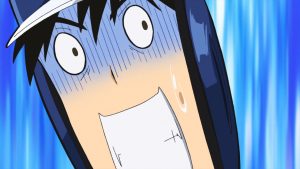
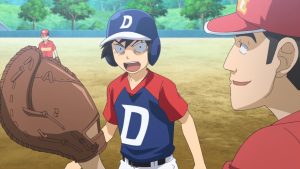


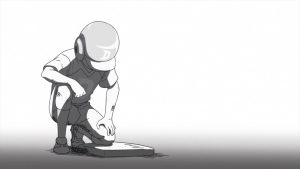


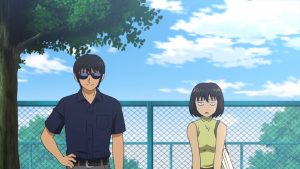
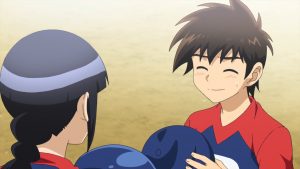
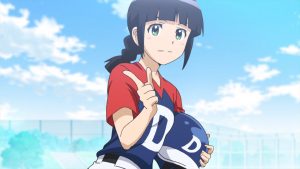
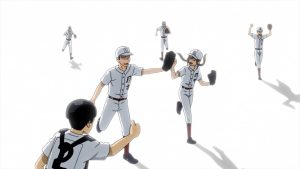
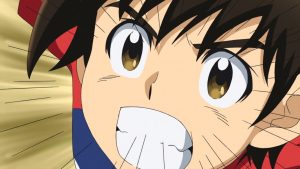
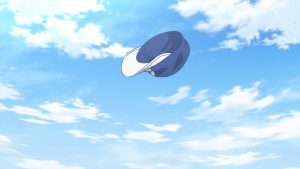
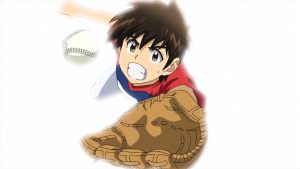

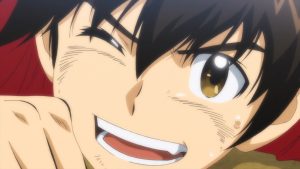

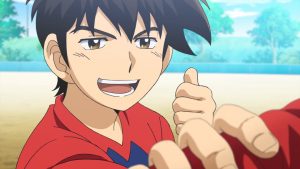
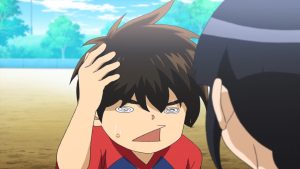
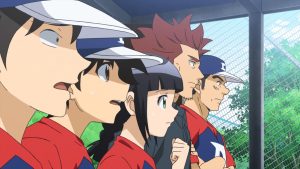


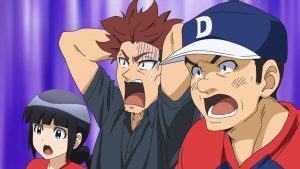
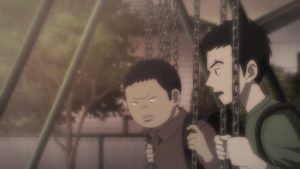
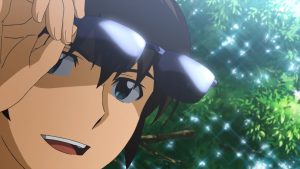
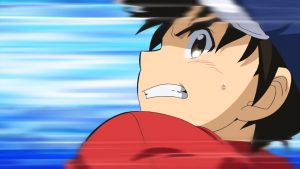
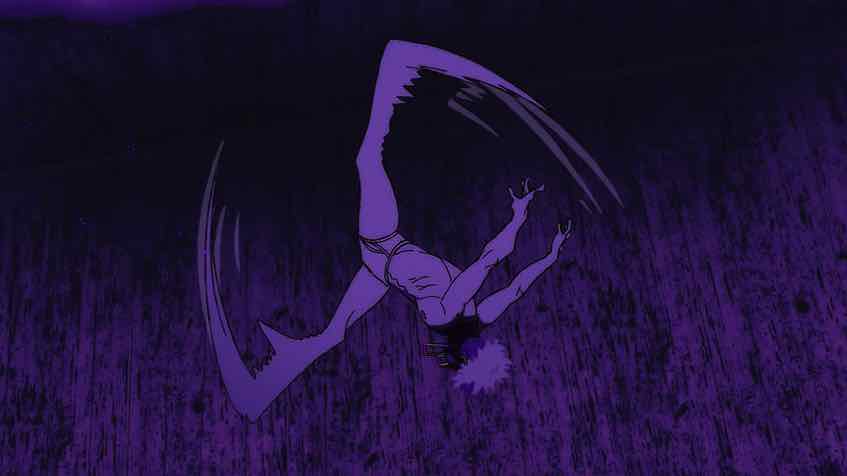
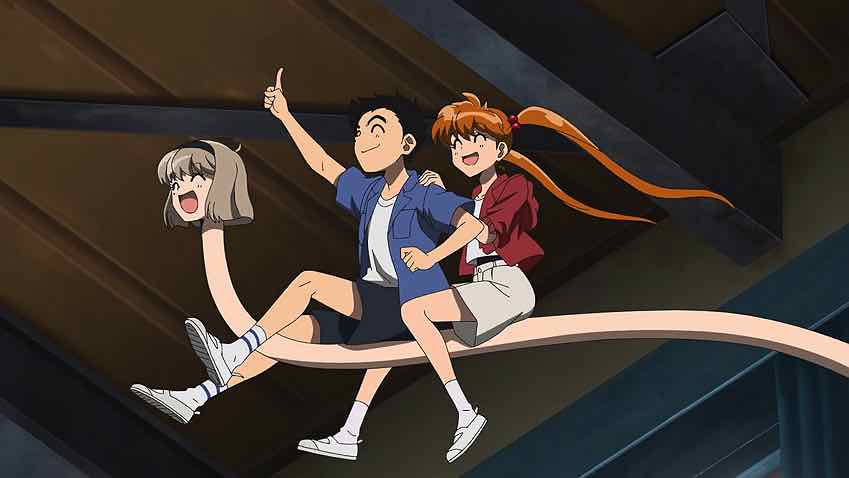
elianthos
June 10, 2018 at 5:06 am– This cliffhanger (and mah Hikaru sadness ) is SUFFERING AND AGONY and even having an inkling it was going to happen doesn’t help one bit.
– You had to mention Ginga E too hadn’t you? Go rip all the heartstrings while you are at it :,)
– Then of course they had to pile the Joe white freeze frame ref on top of that. Even with the slight comedic value twist my tear ducts have been wrung dry.
Daigo’s enthrails on the other hand took much longer to reach the dry stage apparently, poor kid.– Urabe I am disappointed. Never mind (!) what you say but your timing to be a lil shit to your teammate(s) is utterly stupid for a guy who wants to win so badly. What a waste of Interesting Eyebrows. But at least Daigo seems to have shaken him just a tad with his behaviour later on * cue screenshot preview in the post * ? X°D
– Go Daigo let the dorky charm and facial comedy dig a way out and in and ahead XDD. Imposter Syndrome can be a mighty enemy but you can do it!
– Relatedly: a young lady is blushing a lot and accidentally striking a twisty fanservice pose around you 8D
– Toshi <3